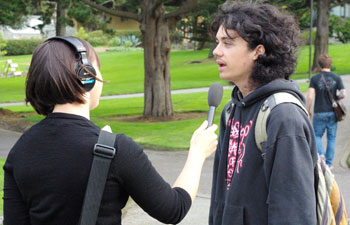It’s understandable if you feel overwhelmed and intimidated by collaboration. After all, the examples of it that often get hyped in articles like this one are big, ongoing projects that have their own funding, business models, staff and offices. They are partnerships between huge organizations that involve lawyers and contracts.
Such large-scale projects have their place, but the amount of time and resources they require can scare some people away from attempting to collaborate.
This article is not about that type of collaboration.
This is about a collaborative project that started with relationships built at conferences and on social media, required only two phone calls, and lasted about six weeks. It shows that bureaucracy isn’t necessarily needed for multiple organizations to work together and have an impact.
Getting a Bigger Audience for Youth Voices
This fall, staff at public media organizations in California, Oregon and Washington state interviewed dozens of young Americans for “From the West Coast: Voices of Young Voters.” The goal was to offer a better understanding of how Millennials felt about politics, the election, and the future of the country.
You can find the project at SoundCloud.com/youngvoterswest and at the four participating stations: KQED in San Francisco, KPCC in Los Angeles, Oregon Public Broadcasting in Portland and KPLU in Tacoma, Wash. I also wrote about the project in a blog post on NPR’s website, and some of the audio is being distributed nationally through the Public Radio Exchange (PRX).
“This collaboration gives our efforts a much broader reach. It’s easy to ask young people what they think, but not as easy to get those thoughts in front of a bigger audience where they might have impact,” said Jake Ellison of KPLU.
That impact can be seen in the extensive discussion the project spurred in the comments section for the NPR post. (We’re still gathering data to measure impact more formally.)
“As one in my mid-twenties it disheartens me when most of my friends are either clueless on what is happening politically or simply do not care,” one commenter wrote.
“I think a growing number of young voters are fiscal conservative, social liberal. And neither Obama nor Romney fit the bill,” wrote another.
“I don’t understand why Millennials are labelled as ‘self centered’ and ‘apathetic.’ The young folks I know are decidedly not so!”, a third noted.

Conversation Leads to Collaboration
The project started in mid-September when I was contacted by Rebecca Galloway, Oregon Public Broadcasting’s senior online editor. Galloway and I had met at a conference, and we shared an enthusiasm for collaboration. She asked about KQED’s outreach efforts around the election; I mentioned we were thinking about interviewing college students. Galloway said Oregon Public Broadcasting was considering similar outreach plans.
She brought in Amanda Peacher, the Public Insight Journalist for Oregon Public Broadcasting. The three of us talked on the phone, decided we had the same goals, and agreed to work together.
We knew that presenting the final project online would be relatively simple. SoundCloud, the social audio site, offered a platform on which we could present our work in a format that was easily shareable. We agreed that each station could present the content on air as they saw fit.
But we also recognized that we had to expand the project to have a real impact. We needed to present the voices of young voters from throughout the West Coast.
I reached out to Kim Bui, KPCC’s associate editor for social media and outreach. Bui and I had first met in a public media Facebook group. She brought in Ashley Alvarado, KPCC’s public engagement editor. Alvarado and I had collaborated when she worked at the Center for Investigative Reporting.
We later found another enthusiastic contributor in KPLU Online Managing Editor Jake Ellison; Ellison and I are taking part in an NPR project involving Facebook.
Working Quickly Towards a Common Goal
We talked via email and had one more phone call to coordinate our efforts. The goal we set was ambitious — we wanted the audio on SoundCloud beginning Oct. 15, which was less than three weeks away.
Each station then collected audio on its own. Some of the staff working on the project partnered with radio producers; others performed their own interviews. At KQED our editors assigned radio reporter Lillian Mongeau to the project.
Mongeau noted that the pace of the project came at the cost of additional coordination, and it may have helped to involve audio producers sooner.
“We ended up uploading pretty different audio products on SoundCloud. A few minutes discussion on whether we wanted totally raw audio, a student introduction or a produced clip would have made the project more seamless,” she said.
Alvarado added that it was a challenge to collect content quickly while ensuring that it met the needs of all the stakeholders — not just the other stations involved in the project, but also KPCC’s editors, reporters and community.
Results
Despite the pressing deadlines, however, each station contributed content that I think reflects the best of what public media has to offer. SoundCloud.com/youngvoterswest showcases the diverse voices of 50 young Americans, ranging from a woman from Oregon who grew up working hard in a motel, to a Cambodian-American man who discussed his struggles to pay for college, and a veteran whose brother is receiving health care from the military.
It’s a project that makes me proud, and it shows that collaboration doesn’t always need to be an intimidating process.
Ian Hill is responsible for social media, outreach and engagement around news content at KQED in San Francisco. He was a reporter at a commercial newspaper for 15 years before coming to public media.

